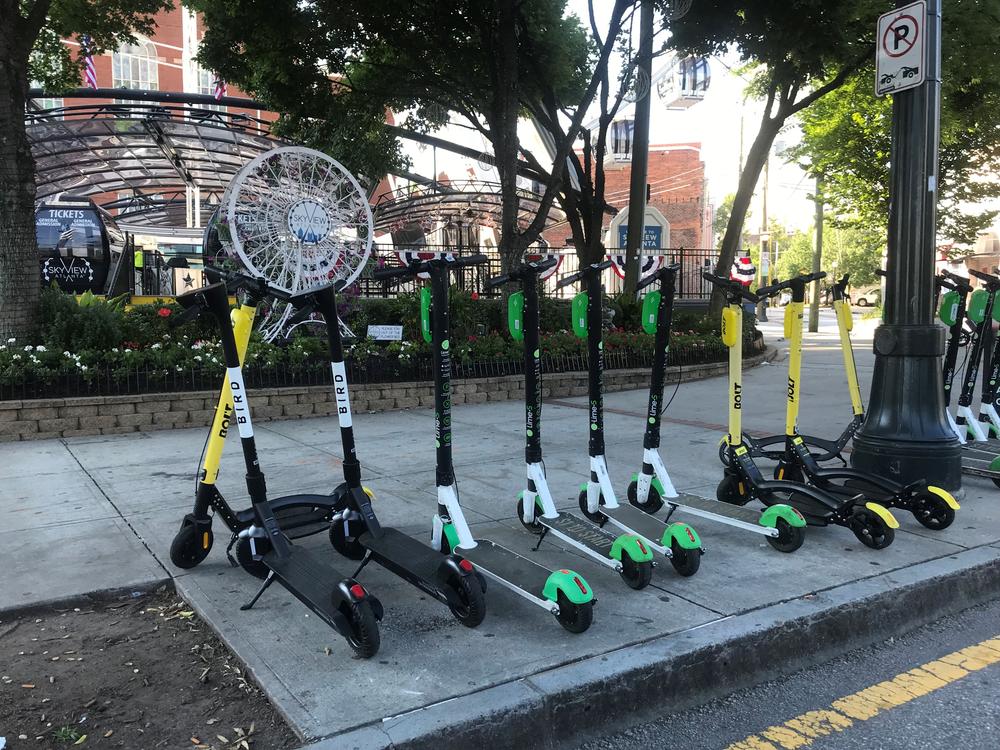Section Branding
Header Content
Atlanta Puts Nighttime Ban On E-Scooters
Primary Content
Atlanta Mayor Keisha Lance Bottoms announced on Thursday a nighttime ban on e-scooters and bikes. Starting Friday, the dockless devices won’t be available for rent between 9 p.m. and 4 a.m.
The decision comes on the heels of multiple fatal crashes involving scooter riders. Four riders have been hit and killed since May.
GPB's Sophia Saliby reports on Atlanta's ban of e-scooters during nighttime hours.
“It is evident that immediate action is necessary to keep Atlanta’s residents and visitors safe,” Bottoms said in a press release. “Sadly, we have seen a pattern in the recent and tragic fatalities involving scooters – they all occurred after sunset. This nighttime ban, while we continue to develop further long-term measures, will ensure the safest street conditions for scooter riders, motorists, cyclists, those in wheelchairs and pedestrians.”
The city will reach out to the operators — Bird, Lime, Lyft, Uber, Bolt, Wheels, Spin — and ask them to disable their devices from being rentable during the ban hours. Nima Daivari is the Community Affairs Manager for Georgia with the electric scooter company, Lime.
He says they’re committed to the city, but a permanent ban would hurt their ability to offer mobility to users.
“We thinks it’s a reasonable step as a temporary measure while the city determines the next steps for their scooter program," he said.
RELATED: Driver Charged In Atlanta's First Electric Scooter Death
The driver in the first death was charged with second-degree homicide by vehicle and speeding. The second death involved a CobbLinc bus, but the driver was cleared in that incident. The third death occurred about a week ago, with reports saying the driver involved then fled the scene.
In the most recent event, Atlanta police said the scooter rider ran a red light during rush hour before crashing into a truck.
After the first two deaths, residents gathered downtown during rush hour to form a human protected bike lane. Bottoms then issued a ban on any new scooter permits, via executive order, until new legislation could be introduced.
On Monday, Atlanta's city council introduced legislation on behalf of the mayor, that would strip the permit giving application from the planning department and leave that up to transportation officials.
The ban is reminiscent of when Bird scooters first showed up in the city last May. Then, the scooters were taken offline at night and collected by people who would charge them before returning them to the street the next morning.
Lime scooters followed, and Atlanta has since struggled with dealing with the explosion of devices. Earlier this year, city council approved regulations for the devices. The city required companies to get a $12,000 permit to operate 500 scooters. Each one after that would cost an additional $50.
Since the new regulations were put in place, nine companies have obtained permits, though only seven are currently in operation. Department of Planning Commissioner Tim Keane said there are a total of 12,700 devices that can be on the street but only about 5,500 are.
Other rules for operating the scooters were also added, such as prohibiting them from being ridden on the sidewalk and setting a speed limit of 15 miles per hour.
Some cities like Athens and Lilburn placed temporary bans on the devices to figure out legislation before allowing them on city streets. Other cities like Alpharetta, Marietta, and Woodstock have completely banned the scooters.

